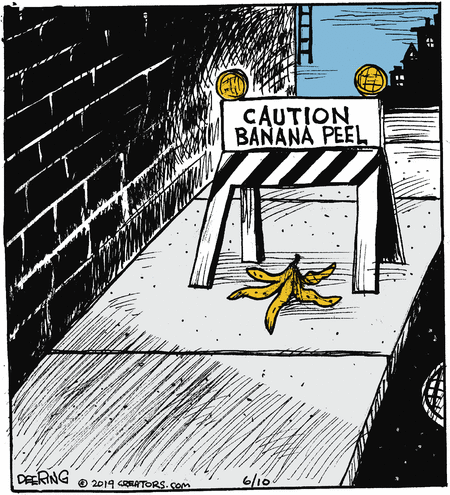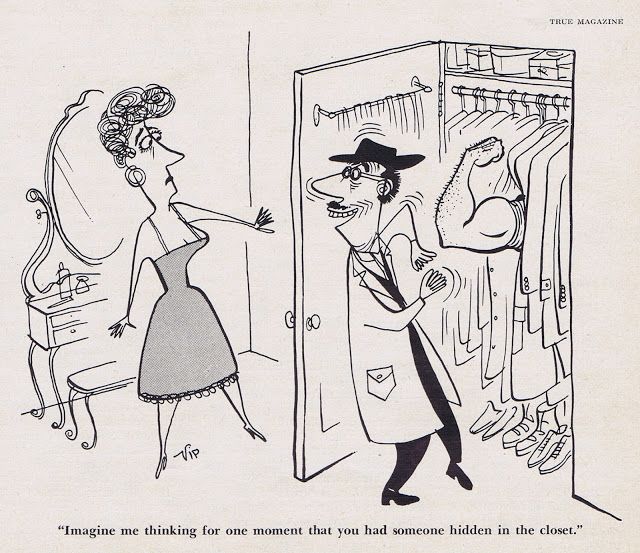CSotD: My ‘I don’t have to run’ day
Skip to commentsBizarro explains it all, or, at least, most of it.
There are any number of directions you could go from here, starting with a reminder of how daunting it is to come up with 313 daily laffs, plus 52 Sundays.
Charles Schulz used to recommend that aspiring cartoonists start by doing a year’s worth of strips and then throwing them all out. The exercise would not only get you into the rhythm of being funny that regularly, but would let you find your characters’ true voices and your own true style in drawing them.
Syndicates put new strips through an extended developmental period, though not a full year. You don’t just drop a promising artist into the deep end of the pool.
But one secret to dealing with the grind is that a lot of artists buy gags, so the Bizarro strip isn’t so far-fetched. There are a couple of strips that are all but ghostwritten, probably about as many as those in which the artist refuses to listen to other people’s ideas at all.
However, many cartoonists buy a gag from time to time.
In fact, Dan Piraro collaborated with Wayno for quite a while, though he would credit him in the margin of each Bizarro they did together, well before Wayno took over the dailies, leaving Piraro to focus on Sundays.
It is widely believed, though nobody has concrete proof, that Chic Young never rebounded from the death of his young son, the model for Alexander in Blondie, and basically oversaw but did not “create” the strip after its first few years.
His son, Dean, has fairly recently started crediting his collaborators, which is an increasing bit of frankness in the industry overall.
Which brings us to another potential thread, the issue of clichés, nicely mocked in today’s Strange Brew.
I don’t know if anyone ever actually slipped on a banana peel, and it’s a lovely example of a cliché because pratfalls are a low form of humor, though they can sometimes be worked into a gag that’s about winter weather or having too many boxes to carry or something.
Which raises the gag from pretty low to only a little bit low. It’s hard to write a pratfall gag that is truly funny.
Which is why banana peel gags are usually intended to mock the concept, as done here, rather than to celebrate it by actually having someone fall on one.
Though cartoonists deserve praise for drawing the banana peel split from the correct end. If you’re breaking it at the stem end, you’re creating work for yourself.
(I like this explanation because she avoids the snide, triumphalist “You’ve been doing it wrong!” mood most self-proclaimed geniuses adopt on social media.)
The other element in this is that there is a distinction between a cliché and a tradition. Mike Lynch has for some time been running excerpts from a book on cartooning clichés at his blog and you can catch up with it using the links at the bottom of his current entry, which includes “Man in the Closet” gags.
The thing is, familiar settings are necessary for comedy to work. You don’t want the viewer to be puzzled by your setting if the goal is to twist their expectations.
After all, “Once upon a time” is a familiar phrase that tells the listener what is coming next. That’s not a cliché; it’s a tradition.
The man-in-the-closet gag always makes me think of this Pardon My Planet from 2013, which still makes me giggle.
I don’t think it would half so funny if Einstein were not in polka-dot shorts and black socks or if he had looked like Cary Grant, though the punchline is still hilarious. But Vic Lee really pulled out all the stops on this one.
Nor would marital infidelity be funny if it weren’t couched in a familiar setting. In fact, there are a lot of jokes that would be distressing if they weren’t set in a traditional frame.
There’s a phrase in Russian literary criticism, “to make new,” which means to describe a familiar thing in such a way that the reader sees it more clearly than ever before. That’s a key in good literary writing, but it’s also required in good gag writing.
Editor’s note: “Cliché” is a noun in English. The adjective is “clichéd.” The recent trend of using cliché as an adjective, as it is in the original French, is a pretentious affectation. I don’t care if you speak English or French or Spanish or Mandarin, but pick a language and stick to it.
Meanwhile, I got a laugh out of today’s Moderately Confused because it shows a silly situation that could never happen in real life.
Men don’t drink smoothies.
On the other hand, the women in this week’s Mo aren’t drinking smoothies, either. I like the variety of beverages Bartender has been making, and I also like the variety of pissed off being depicted.
I’d love to see some politicians walk into this buzz saw and I’d like to see some others rewarded for “getting it.”
And it’s not just the women old enough for Adult Beverages who are becoming pissed off and woke.
I sent one of my oldest reporters — she’s 14 — to the press screening of “Dark Phoenix” and, while she had praised “Captain Marvel,” she didn’t mince words about how far this film fell short of the feminist motif in that one:
This movie could’ve covered racism and sexism in an actually meaningful way. The opportunity was right there, but it was completely ignored. Maybe five minutes of the film actually address how much the mutant population is feared and discriminated against, and even less time goes towards the blatant sexism. Professor X literally takes it upon himself to minimize Jean’s emotional experience and even as an adult, continues to try and make choices for her instead of letting her make them for herself.
In the words of Padraig Pearse, “Beware of the risen people who will take what ye would not give.”







Comments 6
Comments are closed.